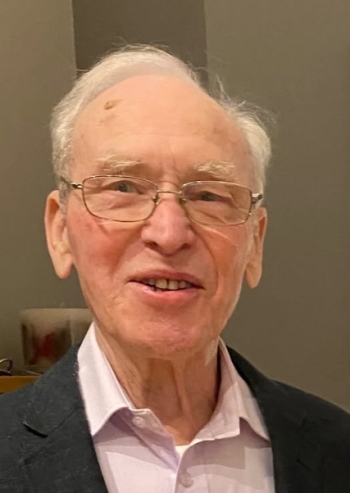
O edrych ar ei gefndir, ‘doedd Alan Jobbins ddim y person mwyaf amlwg i sefydlu Cymdeithas Hanes Plaid Cymru. Ganed ef yn 1940 i deulu di-Gymraeg dosbarth gweithiol yn Aberhonddu. Roedd cenedlaethau ar ochr ei fam wedi byw ym Mrycheiniog ac roedd teulu ei dad wedi dilyn camlas Sir Fynwy o Gasnewydd cyn ymsefydlu yn y dref. Roedd ei dad yn weithgar gydag undeb y gweithwyr rheilffyrdd ac yn pleidleisio i’r Blaid Lafur a bu Alan yn gefnogol o’r Blaid Lafur yn ddyn ifanc, cyn iddo ddod yn weithgar gyda’r Blaid, mudiad cenedlaethol a dysgu Cymraeg yn yr 1970au.
Yn ddi-os bu dylanwad ei wraig, Catherine, oedd o Eifionydd ac yn siaradwraig iaith gyntaf, yn drwm arno. Bu iddynt gwrdd mewn dawns yng Nghanolfan Cymry Llundain ar Gray’s Inn Rd Llundain yn 1965 lle roeddynt ill dau yn athrawon ymysg y miloedd o Gymry ifainc eraill. Wedi priodi bu i’r ddau dderbyn swyddi dysgu yn Chingola yn Zambia. Cafodd Zambia ddylanwad ar Alan. Yn ei henaint esboniodd wrthyf yn syml, “I saw other people have their own country and thought why can’t we have our own country too”. Nododd fod addysg a gweinyddiaeth yn gyfan gwbl Saesneg yn Zambia heb ddim cydnabyddiaeth o’r ieithoedd brodorol. Bu iddo resynu wrth weld bechgyn duon yn dod ar eu gliniau iddo am ei fod yn athro gwyn gan arddel enwau Saesneg yn hytrach nag enwau brodorol. Yn Zambia, gwelodd Alan gymariaethau â gwladychu Cymru.
Er mai Llafur oedd cefndir y teulu ac er nad oedd yn hoffi’r gwersi Cymraeg yn Ysgol Ramadeg y Bechgyn yn Aberhonddu mae’n rhaid bod sbarc weriniaethol Gymreig ynddo yn ifanc. Yn 1956 gyda’r Frenhines Elizabeth II newydd ei choroni ar daith drwy’r dref, wrthododd chwifio’r Union Jack, ac yn 1956 aeth yr athro hanes ag Alan a chriw o’r bois Lefel A i weld dadorchuddio cofeb maenhir Llywelyn yng Nghilmeri.
Yn ystod yr 1980au gyda’i dri plentyn, Siôn, Siwan a Siân, ychydig yn hŷn, taflodd Alan ei hun fewn i’r bywyd gwleidyddol. Roedd yn un o’r nifer o aelodau’r Blaid bu’n gasglu bwyd i deuluoedd y glowyr oedd ar streic y tu allan i archfarchnad Asda Coryton yn 1984. Yn fachgen ifanc, cofiaf fwynhau wy a sglods mewn caffe ym Mhort Talbot lawiog wedi i ni fynychu rali i gefnogi Gwynfor dros sianel Gymraeg yn 1981. Ysgrifennodd lythyrau i garcharorion cydwybod yn yr Undeb Sofietaidd ar ran Amnest Ryngwladol, cododd arian i undeb Solidarnosc yng Ngwlad Pŵyl, a bu’n weithgar gyda’r mudiad Gwrth-Apartheid. Er iddo gael gwahoddiad i sefyll dros y Blaid Lafur gan gymydog oedd yn gynghorydd lleol, gwrthododd hynny, gan sefyll dros y Blaid mewn etholiad lleol yn yr Eglwys Newydd gan dderbyn lythyr bygythiol gan fudiad unoliaethol y ‘Red Hand Movement’.
Yn 1987 roedd yn un o aelodau cyntaf Ymgyrch Senedd i Gymru gan ddod, maes o law, yn ysgrifennydd y mudiad. Wedi buddugoliaeth wyrthiol datganoli yn 1997 parhaodd y mudiad i lobio ac ymgyrchu gan nad oedd y Cynulliad yn Senedd go iawn. Gyda llwyddiant refferendwm 2011 a throsglwyddo pwerau deddfu i Gymru daeth y MSC i ben a bu i Alan olygu llyfr gan John Graham Jones yn adrodd hanes y mudiad.
Yn yr 1990au cynnar taniwyd dychymyg ymarferol Alan gan fudiad yr undebau credyd – banciau nid-er-elw sydd i’w gweld ymhob plwyf yn Iwerddon a gwledydd eraill, ond yn rhyfedd ddigon, ddim yng Nghymru. Gydag hynny, unwaith eto, sefydlodd ef a chriw bychan o wladgarwyr Undeb Credyd Plaid Cymru. Buont yn weithgar yn ei swyddfa yn Nhŷ Gwynfor y Blaid yn ei gwahanol leoliadau ac yna yn Nhŷ’r Cymry ar Gordon Rd, y Rhâth, yn dosrannu a chynilo cannoedd o filoedd o bunnoedd dros gyfnod o 30 mlynedd cyn i’r Undeb Credyd ddod i ben tua 2019.
Ysbrydolwyd Alan i sefydlu Cymdeithas Hanes Plaid Cymru wrth iddo weld cymaint o’r hen do yn ein gadael. Deallodd bwysigrwydd cadw cofnod o’r hyn oedd wedi ei chyflawni. Nododd bod gan y pleidiau eraill ei cymdeithasau eu hunain ac felly bod angen un ar y Blaid hefyd.
Byddai wrth ei fodd gwybod bod y Gymdeithas yn dal i fynd ac yn dal i gydnabod cyfraniad mawr a bach cenedlaetholwyr triw dros y Blaid. Y deyrnged fwyaf iddo fyddai gwybod bod pobl yn ei gofio yntai, fel Cymro cadarn, a ymladdodd dros ei wlad.
Siôn T. Jobbins
mab Alan Jobbins
